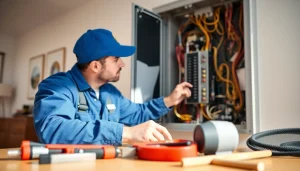Effective Commercial Refrigerator Repair Strategies for Businesses in Need
Understanding Commercial Refrigerator Repair
What is Commercial Refrigerator Repair?
Commercial refrigerator repair refers to the specialized maintenance and restoration of refrigeration units used in commercial settings such as restaurants, supermarkets, and food service operations. Unlike residential refrigerators, commercial units are built to handle higher volumes of goods, operate continuously, and meet specific regulatory standards. Repair services involve troubleshooting, fixing mechanical components, and ensuring that these vital appliances operate at optimal efficiency. The goal is to minimize downtime and prevent food spoilage, ensuring that businesses maintain the quality and safety of their products. For any business requiring commercial refrigerator repair, it is crucial to understand the complexities involved in these advanced systems.
Common Issues and Diagnoses
Common issues with commercial refrigerators include problems such as inconsistent temperatures, unusual noises, excessive condensation, and malfunctioning parts like compressors and evaporators. Diagnosing these problems typically starts with a thorough inspection of the appliance. Technicians check for power supply issues, verify the functionality of the compressor, inspect the condenser coils for dirt and blockages, and look for signs of wear and tear on moving parts. Each diagnosis must be treated with care since overlooking minor issues can lead to larger, more expensive repairs down the line.
Importance of Timely Repairs
Timely repairs of commercial refrigeration systems are critical for several reasons. First, they prevent more severe issues that could lead to complete breakdowns and loss of inventory, which tends to be costly. Second, regular maintenance and prompt repairs help in complying with health and safety regulations that govern the food industry. A malfunctioning refrigerator can lead to health hazards, including foodborne illnesses. Third, establishing an efficient repair schedule can enhance the longevity of the unit, maintain energy efficiency, and save businesses money in the long run.
Signs Your Commercial Refrigerator Needs Repair
Unusual Noises and Temperature Irregularities
Unusual noises from a commercial refrigerator, such as banging, humming, or clicking, can be warning signs of underlying problems. Additionally, if the refrigerator struggles to maintain set temperatures, this indicates potential failure of key components. Variations from the ideal temperature can compromise the integrity of stored food, making it essential for businesses to monitor these signs closely and seek professional assistance when they arise.
Leaking and Ice Buildup Problems
Leaks and ice buildup within a commercial refrigerator are serious issues that not only affect performance but can also lead to structural damage to the appliance. Leaks might originate from the door seals, coolant lines, or drainage system, requiring immediate attention. Ice buildup, especially around the evaporator coils, can signal issues with airflow or refrigerant levels. These problems, if left unresolved, can lead to increased energy costs and equipment strain, resulting in more significant repairs.
When to Call a Professional for Commercial Refrigerator Repair
Knowing when to call a professional can save businesses time and money. As a general rule, if you notice any continued fluctuations in temperature, unusual noises, visible leaks, or if your unit is running constantly without cooling effectively, it’s time to call in the experts. Additionally, if you’re unsure about a minor issue or if routine maintenance is due, it’s wise to consult with a repair technician to avoid escalating issues.
Preventative Maintenance for Commercial Refrigerators
Routine Cleaning and Maintenance Tips
Regular cleaning and maintenance of commercial refrigerators are vital for ensuring their longevity and operational efficiency. This includes routine tasks such as cleaning the condenser coils, checking the door seals, and inspecting internal components for wear and tear. Regularly removing dust and debris from the external and internal components not only improves functionality but also enhances the overall appearance of the unit, which is particularly important in customer-facing environments.
Regular Inspections to Avoid Major Repairs
Conducting regular inspections, ideally on a monthly basis, can identify potential issues before they escalate. During these inspections, technicians should evaluate the condition of the compressor, check refrigerant levels, inspect electrical connections for corrosion, and ensure that fans are operating efficiently. Proactive inspections serve as an early warning system, helping to avoid catastrophic failures and costly repairs.
Seasonal Adjustments and Best Practices
Seasonal changes can affect refrigeration efficiency. In hotter months, the cooling system may work harder, leading to possible strain if not prepared. It is advisable to assess how humidity and temperature fluctuations can impact the unit and make necessary adjustments accordingly. Insulating refrigerant lines in areas prone to temperature variations is a simple yet effective step to maintain efficiency throughout the year.
Choosing the Right Repair Service
What to Look for in a Commercial Refrigerator Repair Company
Selecting the right repair service is crucial for ensuring high-quality work. Look for companies that specialize in commercial refrigeration, as they will have the necessary experience and tools for handling complex issues. Important factors to consider include time in business, licensing, insurance, warranty offerings, and customer support. A reputable company should provide a detailed service agreement that outlines their processes and guarantees.
Reading Reviews and Seeking Recommendations
Before hiring a repair service, it is fundamental to review customer feedback and testimonials. Online platforms, such as Yelp or Google Reviews, provide insights into a company’s reputation and the quality of their work. Additionally, seeking personal recommendations from fellow business owners can help narrow down trustworthy options. A company with a solid track record will have numerous positive reviews attesting to their reliability and effectiveness.
The Cost of Commercial Refrigerator Repair Services
The cost of repairs for commercial refrigerators varies widely based on the complexity of the problem and the service provider. On average, businesses might expect to pay anywhere from $45 to $120 per hour for labor, with diagnostic fees ranging from $60 to $100. It’s essential to gather estimates from multiple companies and look into any warranty they offer on services provided. Understanding the full scope of potential costs can assist businesses in budgeting for necessary repairs effectively.
Future-Proofing Your Commercial Refrigeration
Investing in Quality Equipment
Investing in high-quality commercial refrigeration equipment is one of the best ways to future-proof a business. Quality units tend to come with better energy efficiency ratings, extended warranties, and superior cooling capabilities. Furthermore, spending a little more upfront can reduce the frequency of repairs, yielding savings over time. When purchasing new equipment, make sure to consider energy-saving models that comply with current environmental standards.
Upgrades and New Technologies in Refrigeration
As technology evolves, so do refrigeration systems. Newer models can offer advanced features such as smart monitoring systems, energy-efficient compressors, and more effective insulation techniques. Keeping abreast of these technologies can significantly enhance a business’s efficiency and compliance with environmental regulations. Upgrading older units to incorporate these technologies can lead to reduced energy consumption and improved performance.
Environmental Considerations and Energy Efficiency
More than ever, businesses are held accountable for their environmental impact. Choosing energy-efficient refrigeration options not only contributes to sustainability but also can reduce operational costs. Installing advanced HVAC systems that optimize energy use and employing practices such as regular maintenance to enhance efficiency can significantly lower a business’s carbon footprint. Additionally, staying informed about government incentives for using eco-friendly refrigeration technologies can provide further financial benefits.



